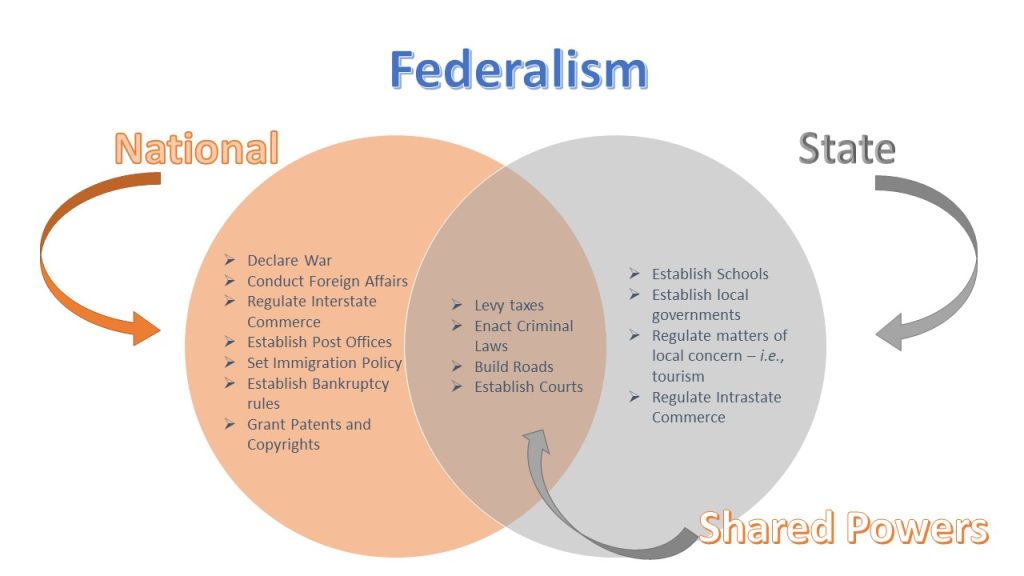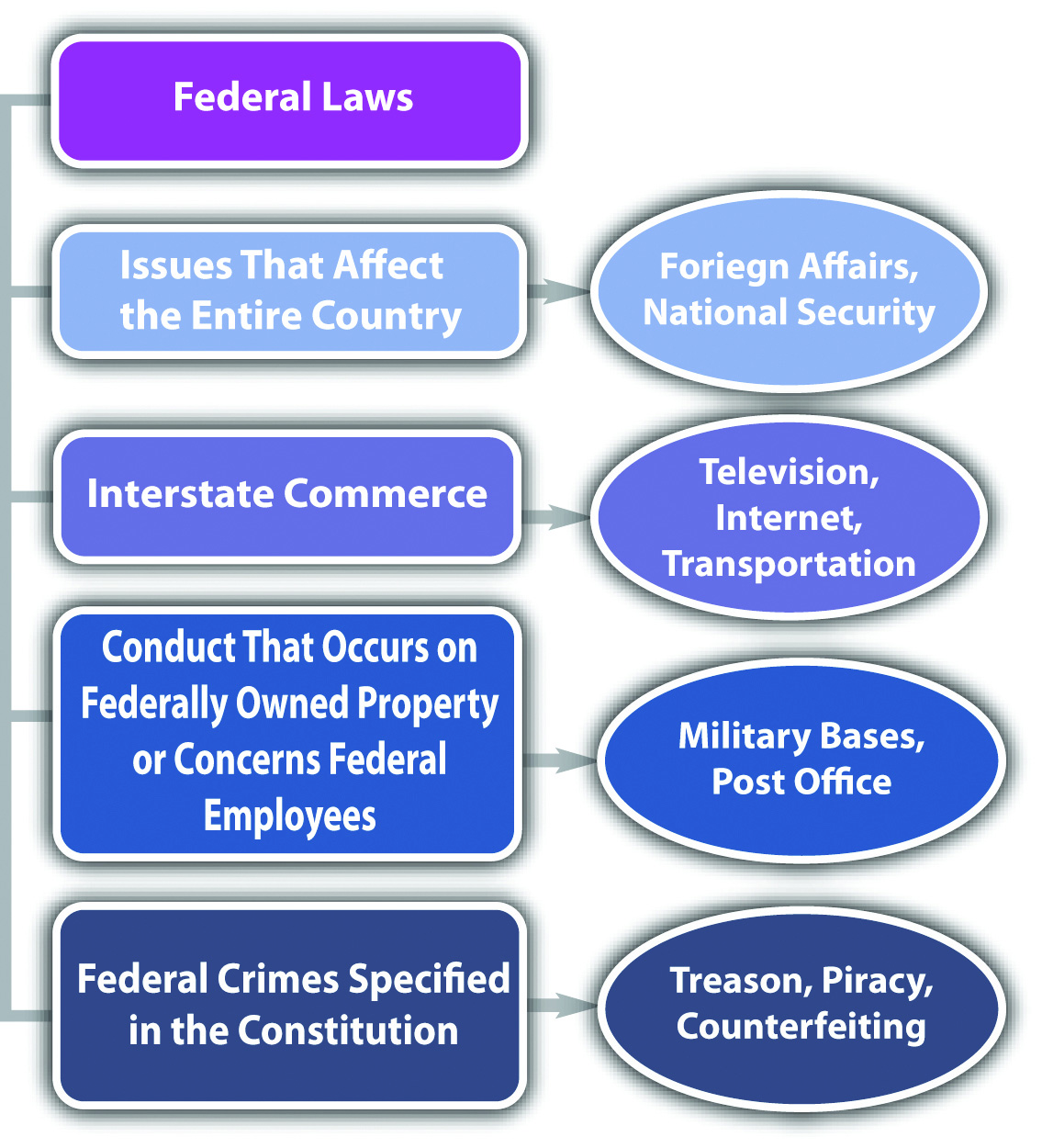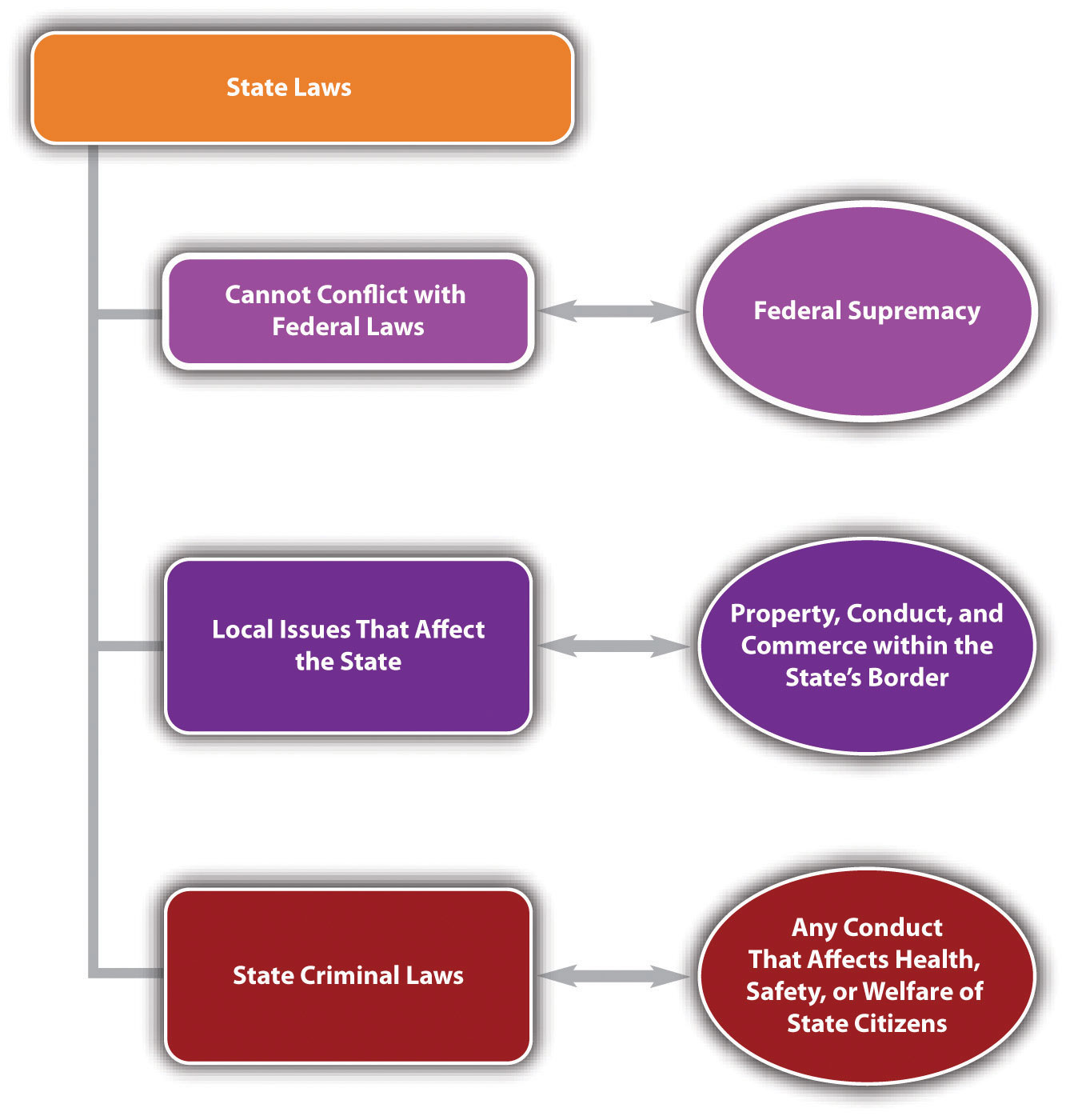Federalism
The United States’ system of government is called federalism. Federalism, as outlined in the US Constitution, divides governmental power between the federal government and each of the individual states. This prevents a concentrated source of governmental power in one individual or small group of individuals. Because of federalism, the United States has a divided sovereign – that is, one federal legal system, and several individual state legal systems. Put another way, in the United States, a plethora of legal systems all operate semi-harmoniously at the same time. Although governmental disputes arise, federalism provides a framework in which such disputes are resolved amicably.
The Scope of Federal Law
The government’s power to regulate comes from the US Constitution. The federal government derives its authority to create law from Article I, § 8, which discusses Congress’s exclusive or delegated powers. These include the power to regulate currency and coin, establish a post office, promote science and art by regulating the rights to discoveries and writings (e.g., patents and copyrights), declare war and raise armies, conduct foreign affairs, regulate interstate and foreign commerce, and make laws necessary and proper to execute other powers expressly granted in the Constitution. Courts have interpreted the last two powers mentioned in the Commerce Clause and the Necessary and Proper Clause to be the broadest sources of federal regulatory authority.
To simplify and summarize precedent defining federal regulatory authority, federal laws are meant to regulate two general areas. First, federal laws regulate issues that concern the entire country, rather than just one city, county, or state. The federal government exclusively regulates in the area of foreign affairs, for example, because this affects the United States of America, not just one particular region. Second, federal laws regulate interstate commerce, which is economic activity, that crosses from state to state. Some common examples are television broadcasts, the Internet, and any form of transportation.
Federal Criminal Laws
The original intent was for the federal government to be a limited government, with the bulk of regulatory authority residing in the states. The only crimes Congress is specifically authorized to punish are piracies and felonies on the high seas, counterfeiting, and treason; however, Supreme Court precedent has expanded the federal government’s power to enact criminal laws based on the commerce clause and the necessary and proper clause See e.g., Gonzales v. Raich, 545 U.S. 1, 9 (2005); McCulloch v. Maryland, 17 U.S. 316 (1918). Still, there must be some connection to an issue of national character and interstate commerce, or the federal government will overstep its authority. In general, federal criminal laws target conduct that occurs on federal property or conduct involving federal employees, currency, coin, treason, national security, rights secured by the Constitution, or commerce that crosses state lines. Currently, over five hundred crimes are listed in Part I, Title 18 of the United States Code, which codifies criminal laws for the federal government. To be fair, much debate surrounds the argument that Congress has exceeded its authority in passing the majority of the U.S. criminal code, and ‘typical’ criminal offenses that should be left to the States’ general criminal jurisdiction. Gamble v. United States, 587 U.S. 678, 710 n.1 (2020) (Thomas, J., concurring). But for now the law is clear: Congress has the power to regulate criminal behavior that impacts interstate markets.
The Scope of State Law
The US Constitution designates the states as the primary regulatory authority. This is clarified in the Tenth Amendment, which reads, “The powers not delegated to the United States by the Constitution, nor prohibited to it by the States, are reserved to the States respectively, or the people.” State laws are also supposed to regulate two areas. First, state laws regulate issues of a local character or concern. A state may regulate, for example, its water ownership and use because water can be scarce and is not generally provided to other states. Second, state laws regulate issues or things that remain within a state’s border. A state generally regulates, for example, the operation of a small business whose products are only sold locally and not shipped out of the state.
Federal laws are the same in every state, but state laws differ from state to state. Something legal in one state may be illegal in another state. This inconsistency makes our system of federalism complicated for students (and lawyers). However, the nation’s founding fathers believed that with a country as large and varied as the United States, it was sensible to allow each state to choose for itself which laws would be most suitable.
State Criminal Laws
The power to enact criminal laws belongs almost exclusively to the states. This is because of the Tenth Amendment, which vests in states a police power to provide for the health, safety, and welfare of state citizens. Approximately 90 percent of all criminal laws are state, rather than federal. Often, federal crimes are also state crimes and can be prosecuted and punished by both the state and federal governments without violating the principle of double jeopardy.
Figure 1.6 Diagram of Federalism and Shared Powers

Example of the Diversity of State Laws
In Nevada, prostitution is legal under certain circumstances. Nev. Rev. Stat. §201.354 (2019). An individual who engages in prostitution inside a licensed “house of prostitution” in Nevada is not exposed to criminal liability. However, if the same individual engages in prostitution in Alaska, he or she may be subject to criminal prosecution. AS 11.66.100.
Federal Supremacy
Our legal system is divided between the federal and state governments to conform to the principle of federalism, so potential exists for conflict between federal law and state law. For example, a federal law may make something illegal; a state law may insist that it is legal. Consider the recreational use of marijuana in Alaska: under federal law, selling marijuana is a felony offense; in Alaska, a regulated dispensary may sell marijuana to an adult. Compare 21 USC 841(a) and AS 17.38.010. Whenever a conflict occurs between federal and state law, courts must follow federal law. This is called federal supremacy. Article VI of the federal Constitution states, “[t]his Constitution, and the Laws of the United States which shall be made in Pursuance thereof; and all Treaties made, or which shall be made, under the Authority of the United States, shall be the supreme Law of the Land; and the Judges in every State shall be bound thereby, any Thing in the Constitution or Laws of any State to the Contrary notwithstanding.” This is referred to as the Supremacy Clause.


